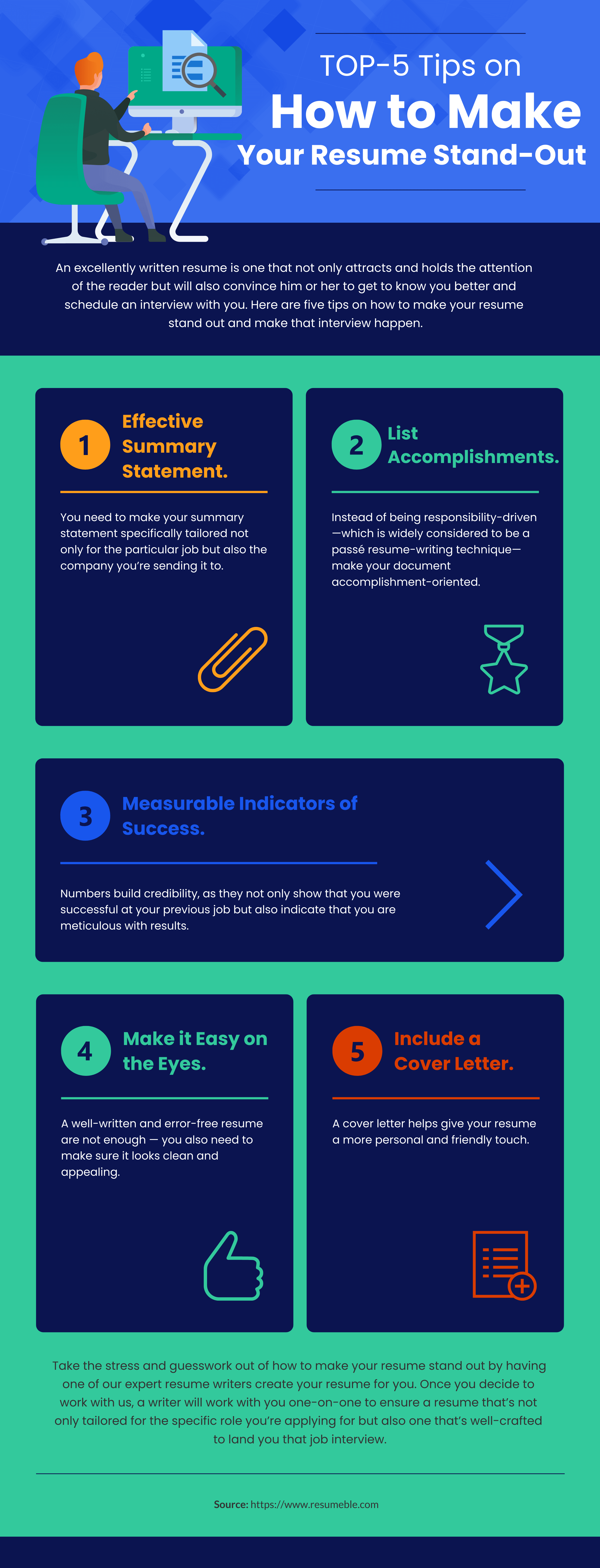Your resume is something that you should never take for granted because a well-crafted resume can open many doors and even bigger opportunities for you.
An excellently written resume is one that not only attracts and holds the attention of the reader but will also convince him or her to get to know you better and schedule an interview with you. Here are five tips on how to make your resume stand out and make that interview happen.

1. Make your summary statement as effective as can be
You need to make your summary statement specifically tailored not only for the particular job but also the company you’re sending it to. The one-size-fits-all resume no longer works in this day and age, and today’s savvy recruiters can easily spot when this is the case.
For an effective summary, begin with a smart description of yourself, then follow this up with a statement highlighting the skills, experience, and education that have the biggest relevance to the position. Mention at least one significant professional achievement. Most important of all, use strong action words to begin your sentences (e.g., achieved, amplified, delegated, established, increased) so you’ll appear confident and capable.
2. List accomplishments, not responsibilities
The biggest mistake an applicant can make is to write a laundry list of responsibilities that they have held in their past jobs. Instead of being responsibility-driven—which is widely considered to be a passé resume-writing technique—make your document accomplishment-oriented. Show your potential employer how you contributed to your organization, how you added value, how you showed initiative, how you handled a difficult situation. By listing your accomplishments, you not only relay what you can do, but you also prove that the way you perform your tasks makes a positive impact.
3. Provide measurable indicators of success
The best approach to showcase your accomplishments is with real numbers because these stand out in the eyes of recruiters and hiring managers. Numbers build credibility, as they not only show that you were successful at your previous job but also indicate that you are meticulous with results.
For a more impressive resume, be sure to provide context for your quantified accomplishments, such as comparing the company’s productivity or profitability before and after your input (e.g., Increased overall profits by 10 percent), or how quick it took you to meet and exceed expectations (e.g., Completed training of 50 employees in two weeks).
4. Make it easy on the eyes
A well-written and error-free resume are not enough — you also need to make sure it looks clean and appealing. Here are tips on how to make your resume stand out visually:
- Use a professional and modern font—good examples include Helvetica, Cambria, or the Word standard Calibri.
- Keep your font size to 11 or 12 for legibility, as well as to ensure you have plenty of space to write in case you have significant work experience.
- Use only black and white colors for formality and consistency.
5. Include a cover letter
A cover letter helps give your resume a more personal and friendly touch. It also allows you to elaborate on your resume, giving you the opportunity to provide more info about your skills and. Even if they don’t ask for a cover letter, it will be wise to include one with your resume. Make sure the font type and size match your resume for a cohesive look.
How to make your college resume stand out
If you are a fresh grad, you’ll have no work experience to speak of, meaning, you’ll have to emphasize other areas. Depending on where your biggest achievements lie, you may need to focus your resume more on education, internship, volunteer work, training, and the like. Aside from these, the tips above remain true for how to make your college resume stand out.
Stop worrying about your resume with Resumeble
Take the stress and guesswork out of how to make your resume stand out by having one of our expert resume writers create your resume for you. Once you decide to work with us, a writer will work with you one-on-one to ensure a resume that’s not only tailored for the specific role you’re applying for but also one that’s well-crafted to land you that job interview.
3 FAQs about resume writing
Q: How long should my resume be?
A: It’s best to limit your resume to one page—two if you have more than a few significant working experiences. Studies have shown that readers only take an average of six seconds to scan a resume. Aside from keeping it concise, a one-page resume ensures that recruiters can make up their mind quickly on whether they are interested in hiring you.
Q: How should I format my resume?
A: The most common resume format is reverse-chronological order. However, this only works if you have an established career. For those looking to change careers or have employment gaps, a functional resume—one that focuses more on skills than work experience—will be more appropriate.
Q: What should I include in my resume?
To provide employers with a well-rounded idea of your qualifications, here’s how you should structure your resume:
- Contact information
- Summary statement
- Work experience
- Skills
- Education
This format works for most cases, but depending on your situation, you may want to organize the sections according to what you want to highlight the most. Regardless of how you choose to format your resume, make sure to put your biggest achievements and most impressive qualifications at the top of it.





